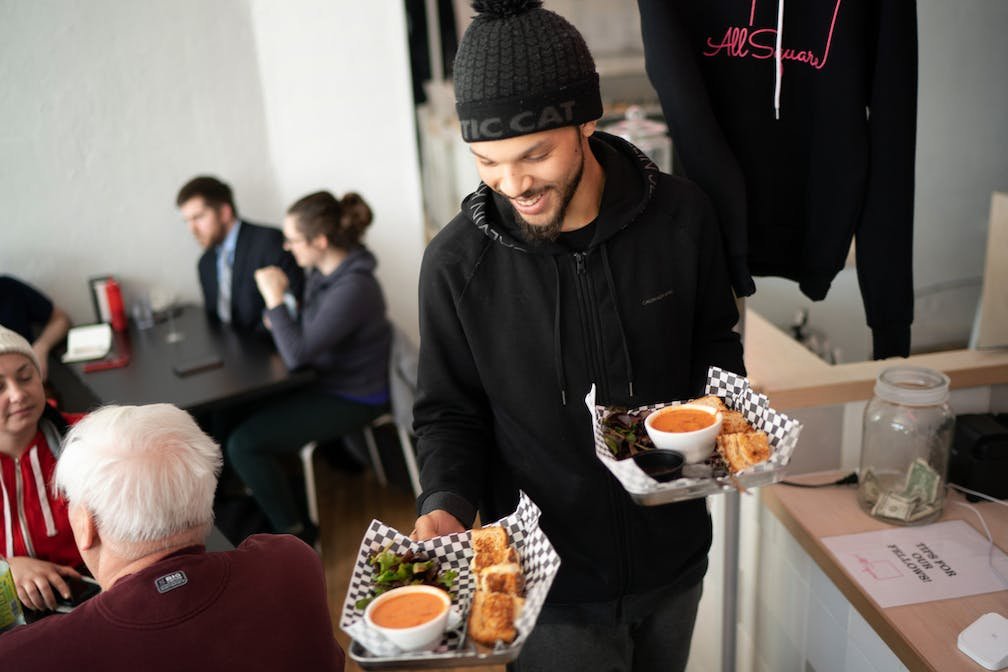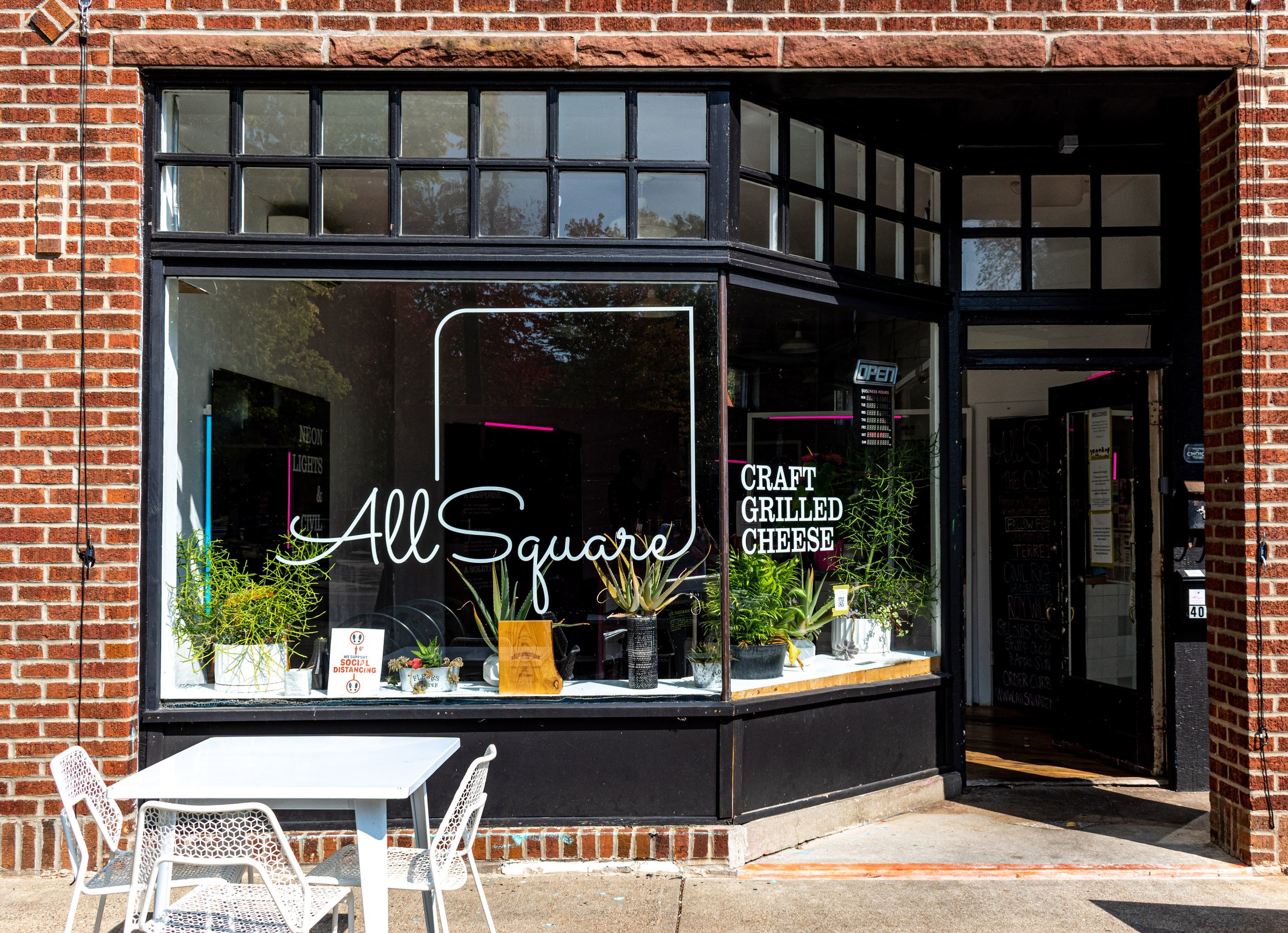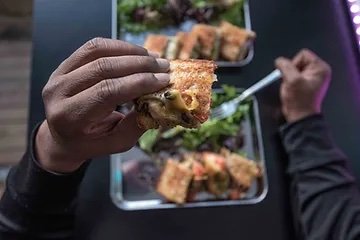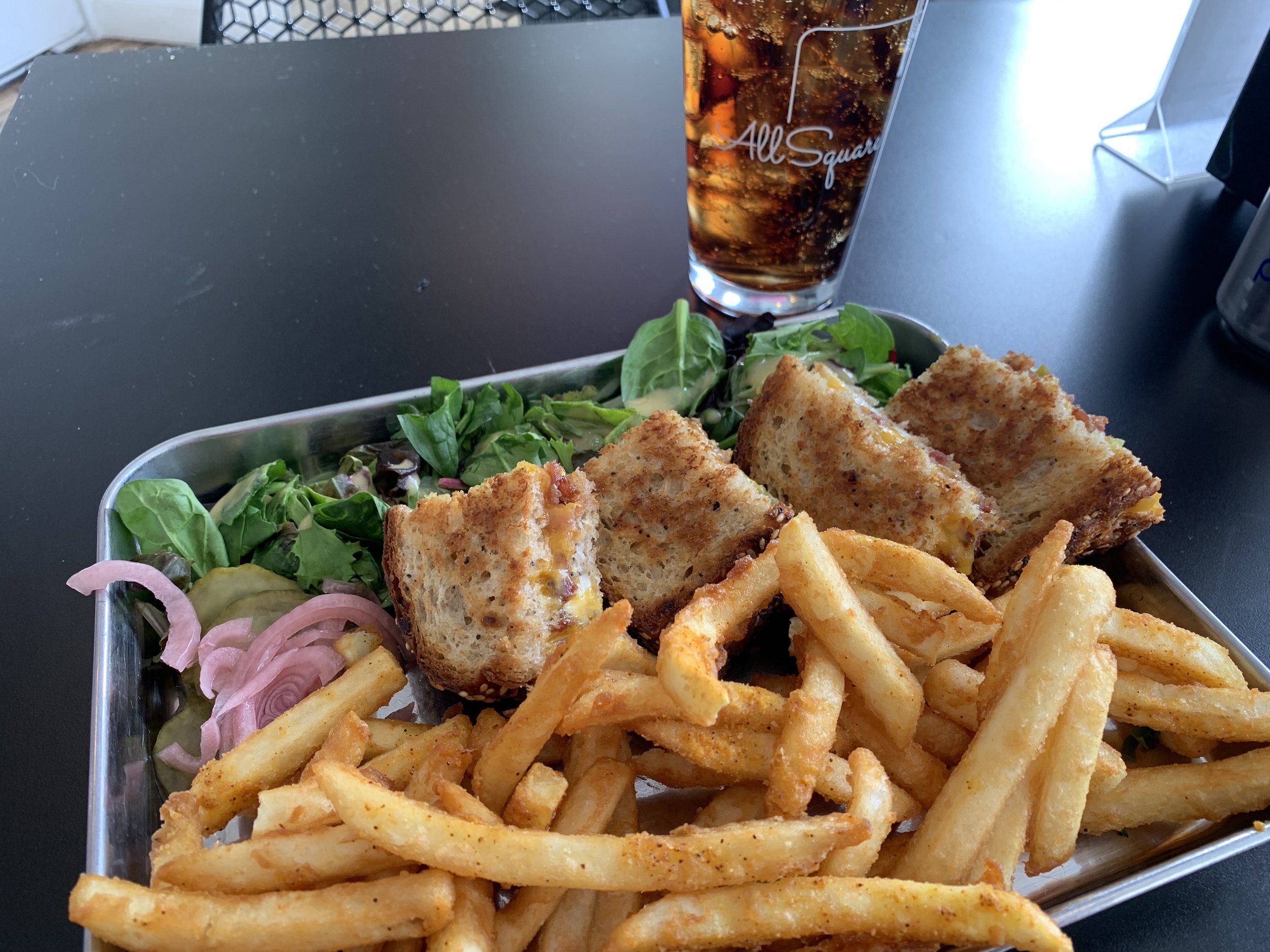Emily Hunt Turner - Justice Served
/Emily Hunt Turner, founder of All square
Words
Humble. Benign. Unassuming. Adequate words to describe a simple, everyday offering, say, a kitchen-table variety grilled cheese sandwich. These words, however, could not describe Emily Hunt Turner, an iconoclast who hopes a remarkable grilled cheese sandwich can slake hunger and serve up Justice. Healing. Reconciliation.
Social Disruptor 1.0
Early in her learning, Emily was drawn to design, and telling a story through space. “I was pulled by things that make you feel something,” she remembers. She studied architecture, then law, analyzing structure and form, even as she considered adornment, discourse, transformation. She earned a job as an attorney for HUD, the Federal organization overseeing Housing and Urban Development, thinking her love of design and social justice (housing as a human right) would align. The agency – unwieldy, programmatic – for all its aspiration, lacked adroitness (and empathy) to solve a single, harsh reality for a subset of Emily’s clients who got swallowed in the legal churn. The change agent observed that people who had been previously incarcerated could not secure housing, a line of credit, or a job - denied categorically because of their criminal record. “It was glaring,” Emily says with a shake of her head. “I could not look away.” With a gut check, and some noodling about capacity and her vision for what could be, Emily quit her job at HUD and founded All Square, a grilled cheese sandwich shop in South Minneapolis. Unsure if her decision was brave or simplistically reckless, Emily (today) declares: “The best way to circumvent the system is to start your own gig.”
The Pivot
“Criminals are not a protected class,” says the lawyer, emphatically. In her study and practice of the law, Emily learned there are no accommodations for people with a criminal record, no protections under the law against discrimination. Within the rule of law in this country, Emily acknowledges, “rules are not applied evenly.” She recounts an incident from her law school days in New Orleans: “A [white] law student arrested for a baggie of weed gets a slap on the wrist. A resident of the 9th Ward, Black, gets life in prison.” Discrimination, Emily says, is baked in. Even after serving time, and supposedly “paying” fully and completely for their crimes, formerly incarcerated people still suffer for their mistakes. A “long-ago criminal history” plagued a number of HUD clients who sought a fresh start. With a grimace, Emily adds: “Four decades later, four decades, individuals were still being punished and disallowed.” Yet, for all her efforts advocating for equity, her reach at HUD was limited. “There wasn’t a damn thing I could do at the ground level,” she asserts. “I needed to be closer.”
All Square’s spunk shows in its branding
Open a Restaurant, Of Course!
As a traveler and ardent observer of place and purpose, Emily had enjoyed single-themed eateries on the East and West Coasts, “Cereal Bars,” she says with a head nod, and “Burger Bars.” It was a concept that appealed to her. “It was simple-as-shit,” she notes. “It was safe. Everyone can enjoy it. There is variety for everyone.” Speaking to her specific sensibilities, she adds: “I’m drawn to simple concepts.” In contrast to the contradictions of HUD (and society’s expectations), opening a cafe offered an opportunity to try something on the ground level of justice and, to Emily, it “felt unifying in a really strange way.”
This line of critical – and creative - thinking continued for Emily: “I think it is fucked up that people with a criminal record can’t move forward.” To prove her chilling point, she squares her shoulders and speaks with added emphasis: “Imagine the worst mistake you’ve ever made.” Full stop. “Now you have to think about that mistake every moment for the rest of your life.” Her words hang in the air. After a moment, her face softens and her hands extend, palms up. A sly smile creeps up on her: “I thought, ‘What if we opened a restaurant, and gave people a chance?’” Emily says she knew right away what she would call it. All Square. She chirps, the most forgiving of birds: “Once you’ve done your time, you’re good. You’re square. You’re All Square.”
She was happy to land on a grilled cheese-themed gig, saying, it felt like a “Midwest concept. Warmth in the cold.” She liked the name because of its double meaning: sandwiches are square, too. Get it? She would offer sandwiches (with flourishes like jalapeños, jerk chicken, fresh basil) and offer sides of tomato soup and French fries to make a square meal. Think: melty, homey, satisfying, familiar, safe. And formerly incarcerated people – the people most impacted by our criminal justice system - would staff the place. Emily would only hire ex-cons, and they would have a place to practice their customer service skills, run a kitchen, manage a schedule, and study the business of running a small business. These formerly incarcerated women and men would shine a professional, competent, and confident face on community, in community. Not only would these people earn employment and a steady paycheck, but All Square would offer a 12-week business class to participants whom Emily has dubbed “Fellows.” With gainful employment and education, the Fellows should better be able to secure stable housing, seek capital, manage debt, and move forward. The Fellows, Emily figures, have served their time and earned their chance to learn, evolve, and try their own hands at entrepreneurship. “All Square,” she asserts, “is the idea of what we need in society.”
Some of all square’s fellows - photo by All square
A Little Help from Her Friends
With the help of many, Emily says she “made the leap” from law to the café concept “to show it could be done, to practice what I preach.” She acknowledges that she didn’t know how much she didn’t know at first, and, despite her naivete, she had amazing champions rooting her on. Raising capital was her first challenge, but she found a force: “I did not come from wealth, but I had been in circles with wealthy people.” She tapped her architecture and law school friends in a Kickstarter fund. She did what she calls a “national tour” pitching her idea of a grilled cheese “restaurant for restitution,” standing before friends and friends-of-friends in New York City, Washington DC, New Orleans, Wahpeton (ND), Fargo, and Minneapolis. That critical mass of people, fueled by Emily’s unbridled brio, made it so. She raised $50,000 - enough to buy kitchen equipment and secure a space to cook and serve and educate, with enough left to advertise, brand it, and dig in. Emily’s life partner, Mel, was her biggest sponsor. “[She] freed up energy in me that I had been previously spending on finding myself, my identity. She helped me open that space up,” Emily praised. “I had a partner who understood the issues, who was committed to the process, who would risk our financial security on this mission.” Mel also offered Emily strong boundaries, something anyone running a non-profit must heed.
Lessons Learned
Since opening in 2018, All Square has, like many small businesses (restaurants in particular), celebrated wins and weathered setbacks. Early in its run, the restaurant received some positive media attention, and Emily won a few philanthropic awards and money. Then came the tectonic triad: the onset of Covid; the murder of George Floyd; and – shockingly - the murder of Randall Smith, a 2020 graduate of the Fellows program, a beloved civil rights advocate, Emily’s friend, and a person she called “the heartbeat of All Square” (his murder remains unsolved).
Despite those calamities, resilience reigns at All Square. Emily’s plan is working out: Fellows are graduating from the program and starting businesses (a food truck, a dance club) of their own; “Legal Revolution,” All Square’s next iteration of “justice served” (repairing damage, empowering forward motion) has launched and offers paralegal and Juris Doctorate degrees to incarcerated scholars (the first American Bar Association-approved law degree program offered to people behind bars in the US says Emily); and, lucky for customers, the sandwiches are – again! - coming out of kitchen hot and delicious and the dining room is OPEN!
All Square fellows - RAYGNE PARKER and Tina Williams
Grace Given
Happily, Emily is celebrating and catching her breath (some) after the years of entrepreneurial hustle; in this moment, she seems visibly relieved to be giving herself a bit more space to breathe. This is hard work, Emily notes: “We are all tasked with absorbing the learning and growing.” Transformation breaks through in the kitchen, in the classroom, and in community as her team simultaneously feeds a clientele, navigates an alternative path through a broken system, and personally reorients and rebuilds. Emily notes there could be no sustainable forward motion without regular breaks for self care - All Square closes the restaurant for one week each quarter so Fellows and staff (both with pay) can rest, contemplate, rejuvenate, and marinate in grace. The grace part is especially important, both for the Fellows and for Emily, who know what it is like to fall and get back up. Emily offers a blessing of sorts: “This is our way to say to our community and staff: ‘You are worth our investment. You get time off because you are doing bigger work than serving folks.’”
Resources:
All Square: https://www.allsquarempls.com/
YouTube on All Square: https://www.youtube.com/watch?v=a6_MS6o2sdU
YouTube on Legal Revolution: https://www.youtube.com/watch?v=KBcRsCi-4-U
Photos: Photos by Tracy Nordstrom, unless otherwise noted. Photo of server and diners at All Square by Glen Stubbe, Star Tribune; photo of exterior of All Square by Milo Waltenbaugh











